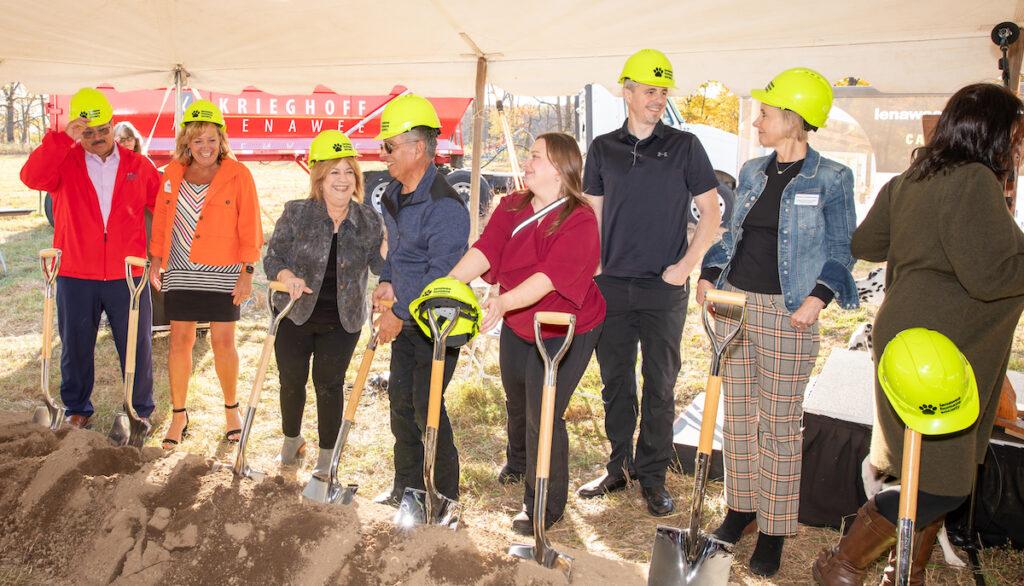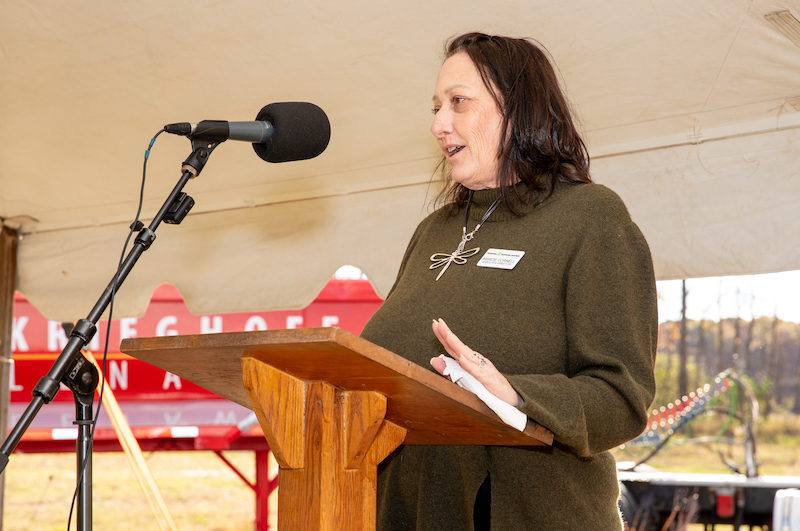
ADRIAN TWP. — Before Marcie Cornell was hired at the Lenawee Humane Society, she had a vision for what she wanted the shelter to become. After her interview, Cornell passed a parcel of land and thought to herself: “some day, we’re going to be there.”
More than 12 years later, the exact location might be different, but Cornell is one step closer to making that dream a reality as the Humane Society breaks ground on their new location on the ProMedica Hickman Hospital campus, kicking off the construction of Phase 1 of their new facility. It might be years before the new facility is ready to accept animals, but it’s a new beginning that’s a long time coming for this staple of the Lenawee County community.
Founded more than 100 years ago, LHS has been in its current location since the early 1980s but, while the shelter has called that space home for more than 40 years, it’s left a lot to be desired. Bounded on two sides by the River Raisin and on the others by another building and the road, there is no room to grow — or do a lot of other things.
“When I started back in 2012, one of the first things I asked was ‘where do the dogs go outside?’” Cornell said.
The answer at the time was: They didn’t. There was no option for the dogs to have off-leash time on shelter grounds, so animals relied on employees and volunteers to take them for walks on-leash. Since then, employees have started parking offsite and walking to the shelter so dogs have dedicated outdoor space.
This sacrifice has been just one of many as the shelter has made the space on Beecher work for its needs. The limited intake space makes it hard to get animals integrated into the shelter, the layout makes for a chaotic experience for potential adopters, and there isn’t adequate space to expand clinic services.
The new facility has been designed with care and expertise to solve all of these problems, making for a better experience for humans and animals alike.
“Our goal is coming true,” Cornell said. “Not just for me but for the staff who have been here.”

Phase 1 will expand the intake space, meaning more animals can be safely brought into the shelter after a quarantine period. It will also provide for a smoother experience for adopters as they come in seeking a companion and expand the clinic space as the shelter looks to become more self sufficient.
The clinic is an important piece in the shelter’s plans for the future. Because it receives no state or federal funding, the shelter is funded almost entirely by donations. One of the only other ways it has to bring in money is the on-site clinic. Started in 2014, the clinic began as a way to do low-cost spay and neuters for those in need. The first year, LHS wanted to spay or neuter 1,000 unowned community cats in the first 12 months. In that first year, they fixed 1,600 cats.
“It was definitely a resource the community needed,” Cornell said. “The clinic has to be bigger to keep up.”
With the new facility, the shelter hopes to expand offerings so that animals in the community can get the care they need.
“We aren’t there to compete with vets,” Cornell said. “We’re there to provide services to those who can’t afford to go to the vet but still have dogs and cats. They still have a right to have that kind of love but the animal should be taken care of.”
With the expanded clinic space, LHS will add another vet and handle basic care with things like regular checkups and vaccines, helping the shelter build toward a more self-sustaining future.
The new location is remarkable in other ways, too. It’s the first humane society in the United States to be built on a hospital campus, offering benefits for animals and humans alike.
“There are tons of research that will tell you the benefits of owning an animal on your health, both physical and mental,” Cornell said. “Plus, being next to the hospital, we see it as we just increased our visitor pool and volunteer pool tenfold. Hospital employees can come over on their lunch hour.”
The hospital location is a big part of making the dream of a new shelter for LHS a reality. When Cornell approached them a few years ago to see if they could sponsor an event, the hospital offered them land instead. She was skeptical at first — what about the sound of sirens and helicopters? — but it didn’t take long for her to come around and for plans to start to move forward.
Even with donated land, those plans come at a cost, one that the shelter has been fundraising for since before the COVID-19 outbreak put a damper on efforts like theirs. Phase 1 of the shelter will total about $6.5 million and is slated to be completed in 2026. Phase 2 will add offices for staff — “We gave up most of our offices in phase one because we don’t have offices now,” Cornell said — and a sallyport that will allow first responders to drop off animals in emergency situations.
The new shelter is 65% funded now and Cornell is confident the community will continue to support their mission of saving the lives of animals while enriching the lives of humans.
“I have met so many amazing people who are so passionate about making a better area, better shelter, better life for the animals,” Cornell said. “I just feel extremely lucky to be surrounded by so many caring and giving people, especially in a world where you hear a lot of negativity and hate. We see awful things but we’re able to make a difference with those awful things and turn them around because of our community. It’s really heartwarming.”
To donate to the shelter, visit lenhumanesoc.org and click on the “Donate” button.

